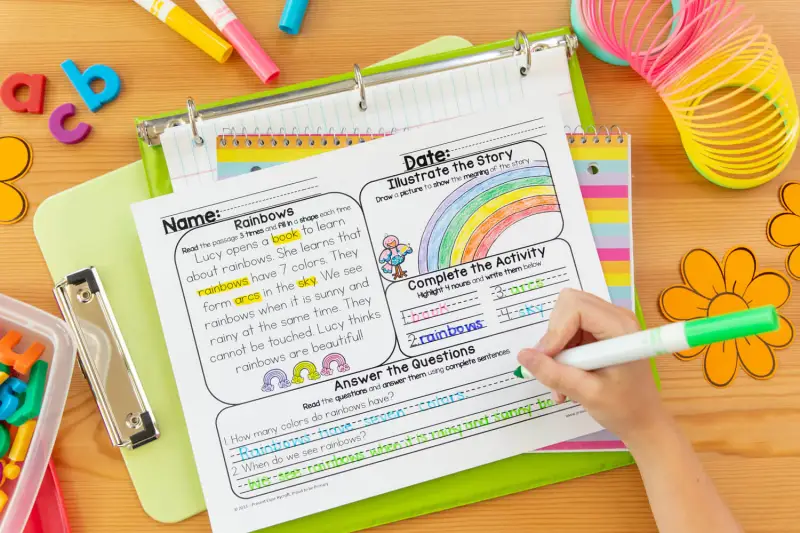When we talk about reading comprehension, it is a full-fledged term that has nothing to do with mere word recognition. It also includes the kind of understanding which results after some words “rest on one’s palate.
However, if the learning method of using and completely understanding the content is not very clear, students may face different problems, such as the lack of comprehension, low self-esteem, and struggle with the curriculum. Appropriate intervention to combat these problems helps children to master reading at an early age.
10 Challenges for 4th Graders in Reading Comprehension
English Spelling Difficulty Words
One of the best 4th-grader challenges is spelling. English spelling rules are difficult with many exceptions, which makes it difficult for students to find and learn new words. If the child experiences spelling difficulty, it can be difficult for them to read words out loud, affecting 4th grade reading comprehension.
Limited Vocabulary
A small vocabulary of words can prevent students from knowing the meaning of a passage. If a child is reading a passage with many words that he does not know, he can lose the plot or main idea.
Limited Background Knowledge
Students understand better when they are able to relate to the topic. If a passage is on something they do not know much about, they might not be able to relate, and they might get confused.
Struggling with Inference and Critical Thinking
Inference refers to reading between the lines—being able to say what isn’t said directly. It’s hard for most 4th graders to make inferences, and it will affect their ability to read more complex material.
Not Having Attention and Concentration
Reading requires attention, and most children do not have focus, especially if the book is long or boring. Distractions may keep them from keeping the information.
Struggling to Find the Main Idea
There are children who read an entire passage but struggle with finding the main idea or main points. It becomes a problem for them to summarize what they have read.
Poor Decoding Skills
Sounding out words accurately is decoding. Children who do not have good phonics skills can read slowly, and it becomes an obstacle to understanding the meaning of a passage.
Fear of Reading Aloud
Sure students lack the courage to read aloud due to pronunciation problems or past negative experiences. This may demotivate them from engaging in reading practice.
Excessive Dependence on Memorization
Certain children try to memorize words rather than understand them. This technique might work for simple texts, but is not good as they encounter more complex material.
Lack of Motivation
If a child does not like reading, they may not make the effort to develop their comprehension. Lack of interest can really impact their progress.
Improving Reading Comprehension By SpellQuiz
Interactive Spelling and Vocabulary Quiz
Spellquiz.com is a perfect means by which the students can easily get to know and understand many new words, enhancing at apt comprehension and spelling.
Dictation and Listening Practice
It gives students the opportunity to listen to words and sentences as part of a concrete implementation of reading, which made it easier to guess what the words really meant in the context.
Customized Learning Paths
The system will provide learning activities tailored to a child’s level so that learning improvements are gradual.
Fun and Engaging Activities
Children will experience the need to continue being active or improve when the learning strategy being employed is based on a video game motivational program, since they will always be aware and interested in bettering their capabilities.
Tips to Improve Reading Comprehension
Encourage Daily Reading
Practice makes perfect. Let them read silently for at least 20 minutes per day. Of course, they should choose their own books for engagement.
Teach Spelling Skills through Games
Word searches, crosswords, and spelling apps will lead to the learning of new spelling words English in an entertaining way.
Teach Context Clues
Get children to read the context when figuring out what they do not know. Guide them to read the phrasing around the words to get the idea.
Summarization Practice
Ask the child if he can tell you in his words what he just finished reading. In this way, the major points are identified, and better retention is enhanced.
Ask the Possible
Discussing books with questions like:
What do you think will happen next?
Why do you think the character made that decision?
How would you feel in this situation?
and it induces critical thinking and inference skills.
Identify Keywords and Main Ideas
It teaches the students to underline or highlight important words in a passage to understand the main ideas.
Read Aloud
Read orally in the company of an adult. It elevates pronunciation, speed, and understanding. They alternate in reading whole paragraphs and then discuss how the story proceeds.
Encourage Writing Activities
The best way to check understanding is to summarize the book and leave room for character or even fantastic settings to be described.
Audio Books and Read-Along Programs
These two aides make it possible to hear the story while following along in a book, leading to the development of better reading skills in children.
Be Patient and Supportive
Every child learns through various aptitudes; hence, each child is different. Such efforts will encourage and praise how well such kids are reading.
Conclusion
In establishing educative success, a mere milestone, which would hardly benefit even in the near future academically, fourth graders must develop reading comprehension competence typically. Parents and teachers can use tools like SpellQuiz.com as well as effective reading tactics to aid students by increasing their learning skills. For example, poor spelling ability, limited vocabulary, and even the problem of maintaining focus could deter them.
Succeeding in reading is something every child can develop over his/her lifetime with just a little bit of patience, the right encouragement, and definitely proper resources.





























